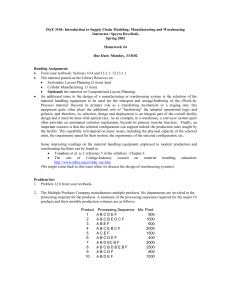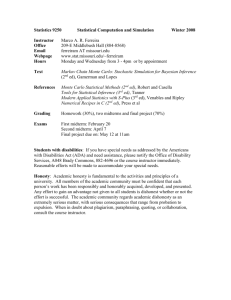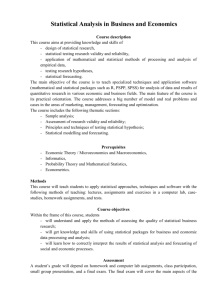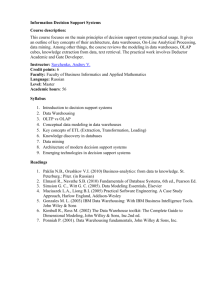IS466_Syllabus-Dr.Ykhlef-1433-1434
advertisement
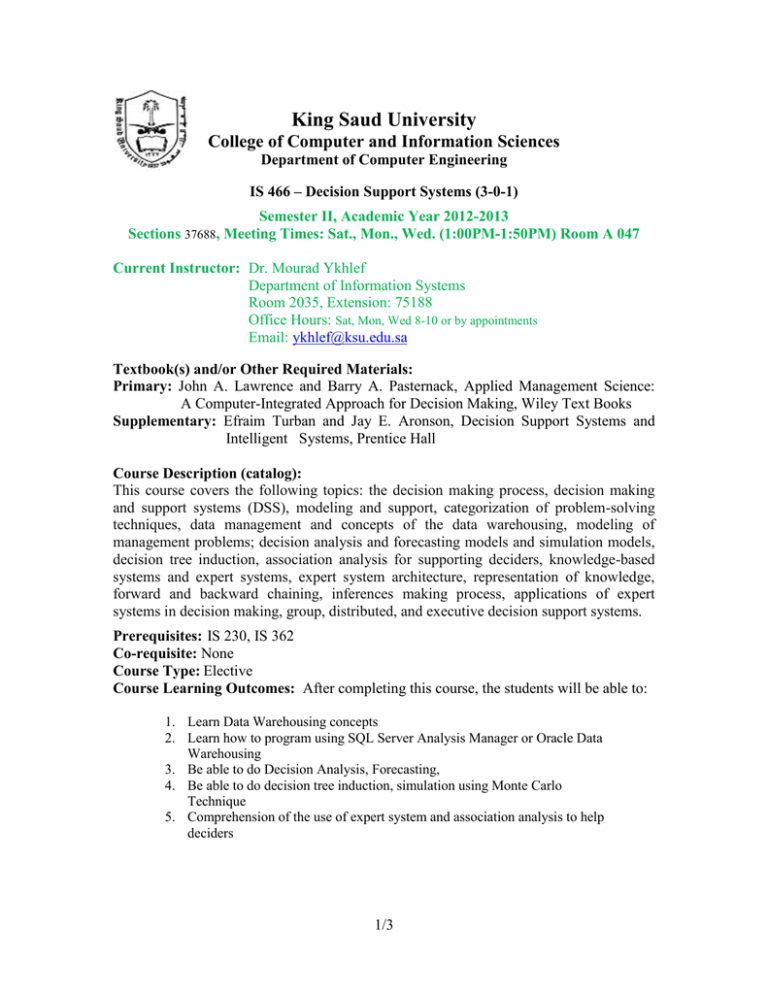
King Saud University College of Computer and Information Sciences Department of Computer Engineering IS 466 – Decision Support Systems (3-0-1) Semester II, Academic Year 2012-2013 Sections 37688, Meeting Times: Sat., Mon., Wed. (1:00PM-1:50PM) Room A 047 Current Instructor: Dr. Mourad Ykhlef Department of Information Systems Room 2035, Extension: 75188 Office Hours: Sat, Mon, Wed 8-10 or by appointments Email: ykhlef@ksu.edu.sa Textbook(s) and/or Other Required Materials: Primary: John A. Lawrence and Barry A. Pasternack, Applied Management Science: A Computer-Integrated Approach for Decision Making, Wiley Text Books Supplementary: Efraim Turban and Jay E. Aronson, Decision Support Systems and Intelligent Systems, Prentice Hall Course Description (catalog): This course covers the following topics: the decision making process, decision making and support systems (DSS), modeling and support, categorization of problem-solving techniques, data management and concepts of the data warehousing, modeling of management problems; decision analysis and forecasting models and simulation models, decision tree induction, association analysis for supporting deciders, knowledge-based systems and expert systems, expert system architecture, representation of knowledge, forward and backward chaining, inferences making process, applications of expert systems in decision making, group, distributed, and executive decision support systems. Prerequisites: IS 230, IS 362 Co-requisite: None Course Type: Elective Course Learning Outcomes: After completing this course, the students will be able to: 1. Learn Data Warehousing concepts 2. Learn how to program using SQL Server Analysis Manager or Oracle Data Warehousing 3. Be able to do Decision Analysis, Forecasting, 4. Be able to do decision tree induction, simulation using Monte Carlo Technique 5. Comprehension of the use of expert system and association analysis to help deciders 1/3 Student Outcomes Covered by Course Outcome Student Outcome Description Coverage (a) a) An ability to apply knowledge of computing and mathematics √ appropriate to the discipline (b) b) An ability to analyze a problem, and identify and define the √ computing requirements appropriate to its solution (c) c) An ability to design, implement, and evaluate a computer-based √ system, process, component, or program to meet desired needs (d) d) An ability to function effectively on teams to accomplish a common goal (e) e) An understanding of professional, ethical, legal, security and social issues and responsibilities (f) f) An ability to communicate effectively with a range of audiences (g) g) An ability to analyze the local and global impact of computing on individuals, organizations, and society (h) h) Recognition of the need for and an ability to engage in continuing professional development (i) i) An ability to use current techniques, skills, and tools necessary for computing practice. (j) j) An understanding of processes that support the delivery and management of information systems within a specific application environment. Relationship between course outcomes and student outcomes # Course Outcomes 1 Learn Data Warehousing concepts Learn how to program using SQL Server Analysis Manager or Oracle Data Warehousing Be able to do Decision Analysis, Forecasting, Be able to do decision tree induction, simulation using Monte Carlo Technique Comprehension of the use of expert system and association analysis to help deciders 2 3 4 5 A Topics covered and schedule in weeks: 1. Preliminaries and Overview 2. Data Warehousing and OLAP 3. Decision Analysis 4. Forecasting 5. Simulation 6. Decision Tree Induction 7. Intelligent Decision support systems 8. Association analysis for deciders 2/3 B X C Student Outcomes D E F G X X X X 1 week 3 weeks 3 weeks 2 weeks 1 week 1 week 1 week 2 week H I J Assessment Plan for the Course Assignments and Quizzes Mid-Term Exams 5% 35% 15% for first midterm exam: week 7 (Monday 11 March 2013) 20% for second midterm exam: week 11 (Monday 15 April 2013) Attendance and Discussions Project Final Exam Total 5% 15% 40% 100% Course Policies: All reports and assignments should be submitted on time; no total grades will be given for late submissions Copying project or home assignments results in zero grading. The final exam will be comprehensive. 3/3

